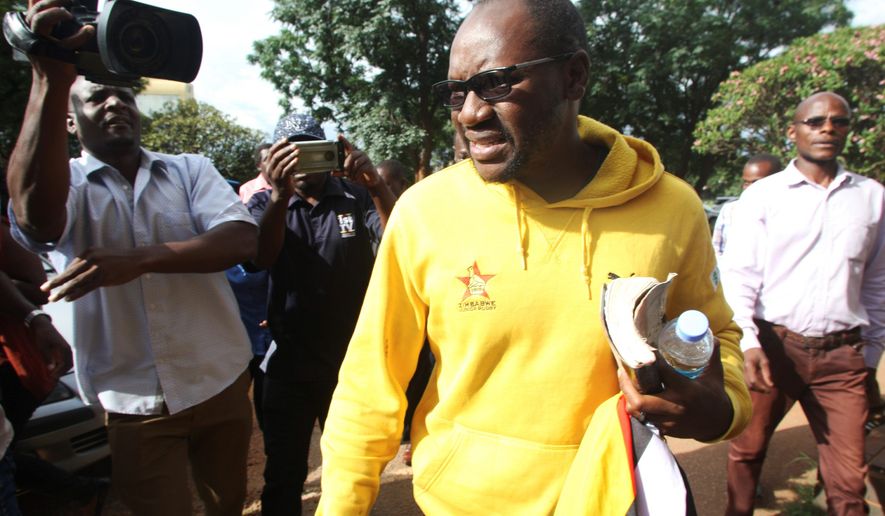JOHANNESBURG — It wasn’t supposed to be this way, not after Zimbabweans finally ousted longtime strongman Robert Mugabe and introduced political and economic reforms designed to turn around one of the world’s poorest and worst-governed countries.
But protests this week after a surprise fuel tax hike are raising questions about how much has really changed under President Emmerson Mnangagwa.
Major cities such as Bulawayo, Mutare and the capital, Harare, remain disrupted and police remain out in force a week after Mr. Mnangagwa sparked riots by announcing the tax, taking gasoline to the world’s highest price of $12.60 a gallon.
Zimbabwe has no oil, and filling stations have largely stood empty since Christmas because of a shortage of foreign exchange.
The government hoped the price hike would ease market strains and address the supply crunch, but the problem dates to the hyperinflation of a decade ago, when the Zimbabwean dollar reached more than $100 trillion to the U.S. dollar. The local unit was suspended in favor of the U.S. currency.
Evan Mawarire, the Zimbabwe pastor and activist who helped rally popular opinion against Mr. Mugabe but now faces up to 20 years in prison on subversion charges, said it was heartbreaking to see the new government reprising the mistakes of Mr. Mugabe, as alarm grew over a violent crackdown on protesters.
“We thought we had a new country and a new way of doing things. None of what I am being accused of is what I have done at all,” Mr. Mawarire told reporters Thursday as he arrived at court in Harare carrying a Zimbabwean flag.
The Zimbabwe Catholic Bishops’ Conference denounced the government’s “intolerant handling of dissent,” saying in a statement Thursday that “our country is going through one of the most trying periods in its history.”
The unrest suggests that Mr. Mugabe’s ruinous legacy, including a violent program of land seizures from productive white farmers and the collapse of the tourism industry, has left the country with little foreign exchange and an economic hole that will take time to escape.
Near the resort town of Victoria Falls on the border with Zambia, Ghosi Mbane, who runs minibus taxis to and from Bulawayo, told the Nation newspaper that filling stations were still dry.
“My vehicles are stranded, and fuel on the black market is selling at [$50] for five liters. This time last month, 5 liters cost just over $7.”
Zimbabwe’s annual inflation rate rose to 42 percent in December, the country’s official statistics agency said Thursday.
‘Trapped’ at home
With an estimated 3 million Zimbabweans now living and working in South Africa, Mr. Mbane said many were trapped in their native country after the Christmas break.
“Masses of people come home once a year over Christmas, and they bring groceries for their families,” he said. “At the end of the holiday, they have just enough money left for the bus back to Johannesburg. But if you can find transport, it is now costing six or eight times the normal price. Workers stuck here are going to lose their jobs in South Africa, and there is a huge amount of anger that could turn to violence.”
At least five people have reportedly been killed by police and soldiers across the country, with many more injured. A government spokesman said about 200 rioters were in custody, but private rights groups put the number at more than 600.
Human Rights Watch and Amnesty International have reported that armed police and soldiers continue to raid homes, assault civilians and open fire with tear gas and live ammunition where they meet resistance.
Dewa Mavhinga, Human Rights Watch’s manager for southern Africa, has called on South Africa and the African Union to intervene.
“This might not go away because it is a message from the people to the government,” he told Voice of America.
With the shortage of cash at home, Mr. Mnangagwa is facing criticism for hiring a private jet for a trip to Moscow and to the tony Swiss resort of Davos for a global economic summit.
In 1982, Mr. Mugabe — who was forced to step down in November 2017 in a military action led by Mr. Mnangagwa, a onetime top aide to the president — nationalized much of the press. The state-owned Herald newspaper has blamed opposition groups and unidentified foreign powers for the violence, describing it as an effort “to overthrow the elected government.”
Mr. Mnangagwa won a disputed election last year, but the U.S. and European Union found flaws in the process.
From Moscow, Mr. Mnangagwa sent a statement calling for calm. “I understand the pain and frustration that many are feeling,” he said. “Resolving Zimbabwe’s economic challenges is a monumental task, but we will get there.”
Ironically, few of his citizens received his Twitter post because the government had shut down cellphone networks and the internet in an effort to stem the popular demonstrations of the past week.
The Associated Press reported that the U.S. Embassy in Zimbabwe said it was alarmed by credible reports that security forces were targeting and beating activists and labor leaders. The U.S. statement also urged Zimbabwe’s government to restore access to social media.
Mr. Mbane, the taxi owner, said he had moved several of his vehicles to a hidden location.
“Buses have been attacked and, while this seems illogical, I can understand the frustration of people who can’t get home,” he said. “It is hard to believe that, when I was at school here in the 1970s, this was among the strongest economies in Africa. Now we are one of the poorest countries in the world.”
He said the situation would change only with democracy, and he felt some sympathy for the president.
“The problem is that Zimbabwe won’t recover without a free and fair election,” he said. “But if Mnangagwa holds one, he will lose and, if that happened, I suspect the army would take over. That puts him in a very difficult position.”




Please read our comment policy before commenting.